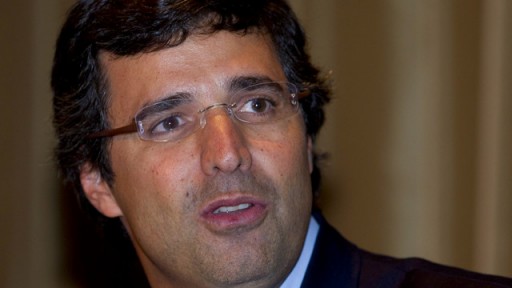- Home
- >
- Uncategorized @en
- >
- Esteves’s ‘Better Than Goldman’

Esteves’s ‘Better Than Goldman’

The golden boy of Brazilian finance is confronting his toughest threat yet.
Andre Esteves, who transformed Grupo BTG Pactual into the largest independent investment bank in Latin America, is now grappling with fallout from his firm’s loans and investments in companies linked to the nation’s biggest-ever corruption scandal.
Having disrupted an entrenched industry dominated by old-line banking dynasties, traditional banks and foreign lenders, Esteves became a billionaire before turning 40, then joked that his firm would become “better than Goldman” -- a play on the company’s name.
Now those accomplishments are showing signs of strain. Investors unable to gauge the risk of BTG’s private equity stakes, which the company keeps secret, have sent the stock tumbling. BTG bonds were the worst performers among any of the biggest Brazilian banks since Feb. 25, when the Sao Paulo-based firm reported profit that missed analysts’ estimates.
The 46-year-old’s best opportunity to set the record straight might come next month, when BTG releases first-quarter results and may disclose whether it’s writing down a 1 billion real ($320 million) investment in Sete Brasil Participacoes SA, a supplier of oil-drilling platforms. The company fell victim to the corruption scandal engulfing Brazil’s oil and construction industry.
Esteves has said that he can deliver a 20 percent return on equity this year, even if Sete Brasil collapses. Goldman Sachs Group Inc.’s ROE was 11.2 percent in 2014.
The Rio de Janeiro native has become something of a target among his rival Sao Paulo banking executives. Speculation the firm was trying to sell itself to one of several larger banks has made the rounds in recent months. BTG has stuck to its close-to-the-vest strategy, denying the speculation amid complaints that its “black box” of undisclosed private-equity investments and loans leaves it vulnerable to attempts to undermine its reputation.
Others see that as an opportunity.
“We think the market is significantly underestimating BTG’s earnings recurrence,” Morgan Stanley analysts Jorge Kuri and Felipe Salomao said in a March 30 report that called “black-box” concerns “one of the key misconceptions that the market has had on the company.”
Morgan Stanley, which said its report was based on a visit with Esteves, has the equivalent of a buy rating on BTG’s shares. The analysis points out that after the completion of the acquisition of BSI Group Inc., Assicurazioni Generali SpA’s Swiss private-banking unit, approximately 43 percent of BTG’s revenue will come from asset and wealth management, businesses with relatively stable results and high profit.
Still, Sete Brasil isn’t Esteves’s only bad bet. BTG has stakes in Brasil Pharma SA, BR Properties SA and Banco Pan SA each of which tumbled more than 40 percent last year, and corporate-lending revenue fell by more than half in the fourth quarter from three months earlier after BTG set aside more money for loan losses.
Esteves said in February that those provision increases were mostly related to BTG’s exposure to Eneva SA, the power producer that filed for bankruptcy protection in December.
The string of losing wagers contrasts with one of Esteves’s biggest successes: In 2009 he bought back for $2.5 billion the firm he sold to UBS AG in 2006 for $3.1 billion.
Now Brazil’s only publicly traded investment bank, BTG reported fourth-quarter net income of 848 million reais last year, below analysts’ estimates. Principal investments, which include private equity, real estate and proprietary trading, posted a loss of 132 million reais, compared with revenue of 474 million reais a year earlier.
Total lending to petrochemical, oil, gas and construction companies, the industries most affected by the corruption probe into Petroleo Brasileiro SA, comprises about 14 percent of BTG’s total loans, Deutsche Bank AG said in a March 8 report. That’s the biggest exposure among Brazil’s top publicly traded banks, according to Deutsche Bank’s Tito Labarta. Only 10 percent of BTG’s revenue in 2014 came from lending, the lowest among its competitors, said Labarta, who reduced his net income estimate for BTG by 8 percent, citing its “limited transparency and wholesale funding risks.”
The bank said in an e-mail on March 17 that 4 percent of its credit portfolio is in the oil and gas sector. While 40 percent of that is guaranteed by Petrobras, another 40 percent is with European and Latin American companies with no relationship to Brazil. An additional 20 percent is diversified, with no significant concentration in any single company.
In the construction sector, BTG said that most of the exposure they have is to large companies that are well capitalized with strong balance sheets and valuable assets that can be sold if necessary, according to Morgan Stanley.
After the BSI acquisition, BTG will also be less exposed to Brazil, with about 50 percent of revenue expected to come from outside the country this year, according to an e-mail from the company on March 12.
The firm last July agreed to acquire BSI, which will almost double BTG’s assets under management to more than $200 billion.
The expansion may help BTG diversify revenue and deal with a “difficult macro environment in Brazil,” Deutsche Bank’s Labarta said at the time.
 Varchev Traders
Varchev Traders If you think, we can improve that section,
please comment. Your oppinion is imortant for us.






